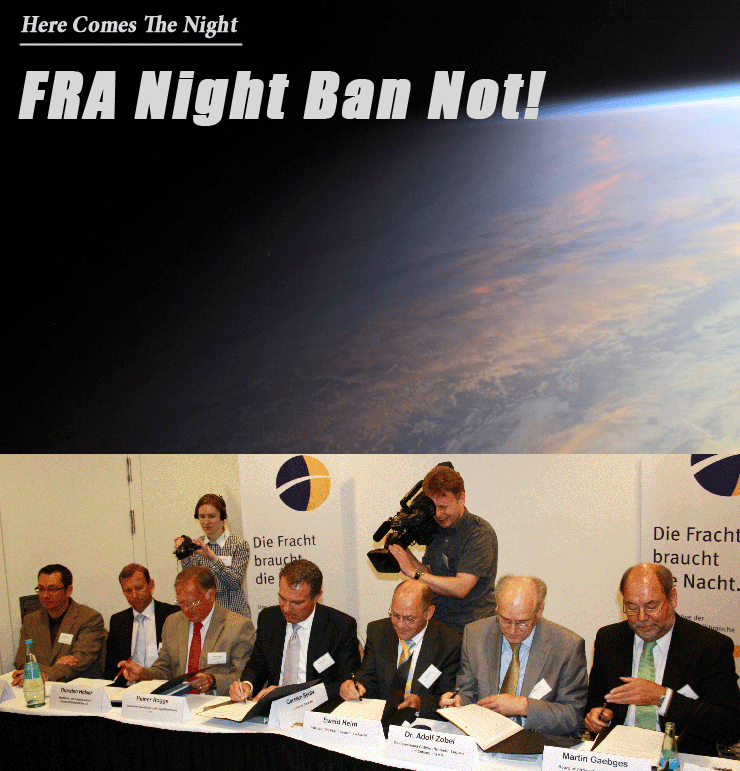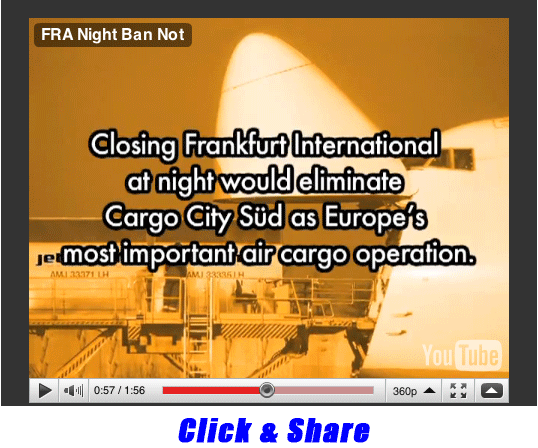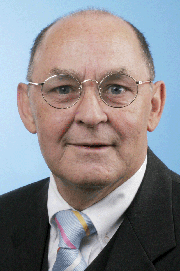Frankfurt International Airport Faces Night
Closure

June 24, 2010
was a remarkably important day for the German air freight industry. At
9:30 am, seven leading managers of the logistics and cargo industry sat
together at Frankfurt Airport’s Sheraton Hotel to give birth to
an initiative called “Die Fracht braucht die Nacht”—“Cargo
Needs The Night.”
These seven managers hailed from The Association
of German Freight Forwarders and Logistics Operators (DSLV), the Federal
Association of Road Haulage, Logistics and Disposal (BGL), the Forwarding
and Logistics Association of Hessen/Rheinland-Pfalz, the Board of Airline
Representatives in Germany (BARIG), the Air Cargo Club Germany (ACD) and
Lufthansa Cargo.
It was the first time that the industry
joined forces to better conditions for achieving optimized transport conditions
and prevent airports in Germany from being forced to switch off their
lights for six or seven hours each night.
Initiator of the new pact is Lufthansa Cargo,
which fears having to scrap its business model if the carrier’s
global hub in Frankfurt is closed between 11pm and 5am when runway number
four is inaugurated in fall 2011.
“Germany is the world’s second-largest exporter – thanks
above all to its logistics expertise. Anyone who shuts down central logistics
hubs at night is acting irresponsibly and putting the future viability
of Germany’s export industry at risk,” said Carsten Spohr,
Lufthansa Cargo CEO and Chairman.
At this time, Germany has some of the most
rigid flight restrictions when it comes to night flights, which threatens
Germany’s ability to compete with less strictly-controlled cargo
hubs such as Paris,
Madrid, Amsterdam and London and especially the Gulf, which directly competes
for transcontinental business between Asia and Europe and Asia and America.
Herr Spohr, speaking on behalf of the initiative
called on the federal government to intervene, and the topic is pending
a Federal Court’s decision, which is expected for spring of next
year.
Air Cargo News FlyingTypers exclusively
interviewed Ewald Heim, the newly enthroned Managing Director of the night
flight initiative. Herr Heim is a veteran of the cargo industry having
worked for many years for Lufthansa Cargo, forwarder Rhenus, and logistics
provider Panalpina where he acted as director air freight before retiring
last year. He is back on deck again with his new job at the initiative
 ACNFT:
Are you like a modern Don Quixote, fighting vigorously
but hopelessly against windmills—pardon—night flight restrictions
at German airports? ACNFT:
Are you like a modern Don Quixote, fighting vigorously
but hopelessly against windmills—pardon—night flight restrictions
at German airports?
EH: Nice comparison,
but wrong. We have a very serious problem in Germany with local or state
courts deciding increasingly in favor of noise restrictions at airports,
especially concerning traffic during night hours.
This has caused cuts in flight operations
at a number of our international airports or banned traffic during critical
times between late evening and early morning. Take Berlin International,
which, according to plans, will see its first arrival of an aircraft in
exactly two years. Although located outside the city’s boundaries,
the place will have to shut its gates at night due to a court decision.
Consequently, the German capital will cut off passenger and cargo traffic
entirely during nighttimes.
ACNFT: What spurs
your hopes that your initiative can change things for the better?
EH: We’ve
just set up our organization, so it’s too early to say what we may
realistically achieve and how long this might take. But right on top of
our agenda is our aim to sit down with leading politicians and government
members to elucidate the night flight topic.
I think we’ve got some highly convincing
arguments to discuss with them. The fact is that the former coalition
of Conservatives and Social Democrats had already announced plans to change
the laws for enabling traffic at night at German airports if this service
is valued as a matter of national interest. That government, however,
had decided nothing until its term ended last fall. The newly built Berlin
coalition, which consists of Conservatives and Liberals, also promised
right from the start to amend the laws in favor of fair traffic solutions
that include the interests of the industry, but regrettably there have
been no results so far.
 As
things stand today, nobody can really blame the judges for banning noise
by restricting operations during the critical hours at German airports. As
things stand today, nobody can really blame the judges for banning noise
by restricting operations during the critical hours at German airports.
Their opting in favor of the dwellers is
understandable considering the legislative and law situation. But the
consequences are bitter for the entire nation, because our logistics sector
is crippled piece by piece. It is Germany’s third biggest industry
right after retail and automotive, contributing 10 percent to our national
product.
If more night flight restrictions are imposed,
shippers and their forwarders have no alternative but to use airports
like Amsterdam, Liege or Paris CDG to have their air freight lifted. I’m
highly convinced that a rational discussion will lead to a climate change
in this country and to new or amended laws that are in line with the necessities
of the airport neighbors and the German industry. It is possible to balance
the legitimate interests of both groups involved. So to finally answer
your question: no, I don’t feel at all like a modern Mr. Quixote.
ACNFT: How do you
explain that hardly anybody protests against the noise of freight trains
running continuously during day and night hours every five minutes through
heavily populated places, or against Autobahns linking German cities?
Instead, air traffic seems to be public enemy number one when it comes
to noise and pollution. Any ideas?
EH: The reason
might be that most people drive cars themselves and use trains more or
less frequently to get from A to B. When it comes to air traffic there
is a lot of prejudice and irrationality that influences people’s
behavior. It seems that many don’t know that manufacturers like
Boeing or Airbus, together with turbine producers, brought noise emissions
down to a remarkably low level. This is exactly one point on our initiative’s
program: to inform the public of these things.
ACNFT: How many
jobs are at stake if the Federal Court decides against the 24/7 opening
of Rhein/Main and Frankfurt is shut down during night hours?
EH: The exact number
is speculative, but thousands of jobs will be lost.
This includes carriers, forwarding and handling
agents, and also logistics people in import and export department warehouses
run by the shipping industry. The consequences will be very severe because
many forwarders will pack their bags and move from Frankfurt’s Cargo
City South to Amsterdam, Paris or other airports where shipments are flown
in and out around the clock. It’s an illusion to believe that they
are going to stay in Frankfurt if the mass of their freight is being routed
via other airports. The agents have made it very clear that splitting
up their operation between Frankfurt and some other European cargo hub
binds too much capital and is therefore not a viable option.
Heiner Siegmund |



